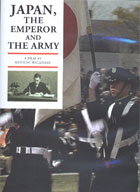
Japan, The Emperor and The Army 2009, 2010 release
Distributed by Icarus Films, 32 Court St., 21st Floor, Brooklyn, NY 11201; 800-876-1710
Produced by Olivier Mille, Christine Watanabe for Arte France, Artline Films, KAMI Productions
Directed by Kenichi Watanabe
DVD, color and b&w, 90 min.
Sr. High - Adult
Asian Studies, History, Political Science
Date Entered: 01/19/2011
Reviewed by Cliff Glaviano, formerly with Bowling Green State University Libraries, Bowling Green, OHOn August 15, 2010, liberal Japanese Prime Minister Naoto Kan angered Japanese conservatives by refusing to attend rites at Tokyo’s Yasukuni Shrine commemorating the 65th anniversary of the end of World War II. Sixty-five years earlier, August 15, 1945, the Japanese first heard the actual voice of their emperor as Hirohito capitulated to the surrender demands of the Allies in his first radio broadcast. American general Douglas MacArthur, leader of allied occupation forces, chose to isolate Hirohito from trial as a war criminal because the Japanese people and armed forces precisely followed the emperor’s directions in laying down arms and cooperating with the Allies. MacArthur saw Hirohito as an effective means of transitioning from militarism to democracy in a peacetime Japan.
To facilitate the transition, a new Japanese Constitution was quickly drafted by the occupation forces and passed by the Japanese Parliament in 1947. Article 9 of the Constitution outlaws warfare, prohibiting Japanese armed forces, yet allowing “self-defense” forces that serve a similar function. As a result, Japan remains semi-occupied by U.S. forces and effectively, has no independent foreign policy. For reasons explained in the video, opinions on Article 9 and state visits to Yasukuni get extremely personal and tensions run exceedingly high. The challenges and ambiguities of Article 9 suggest Japan needs a new constitution to serve its people in the 21st century.
Technically, this video is outstanding. The viewer can select titles and narration in French, English or German with subtitled text in the same languages for interviews in Japanese. As expected of a commercial documentary, editing, sound, and cinematography are excellent. Director Watanabe tells a complicated tale coherently and impartially. Japan, the Emperor and the Army is appropriate for high school audiences, but will be most effective in college or graduate studies in history and policy studies. The controversy over Article 9 leads to profound questions on the nature of what it means to be Japanese in the 21st century. Recommended.